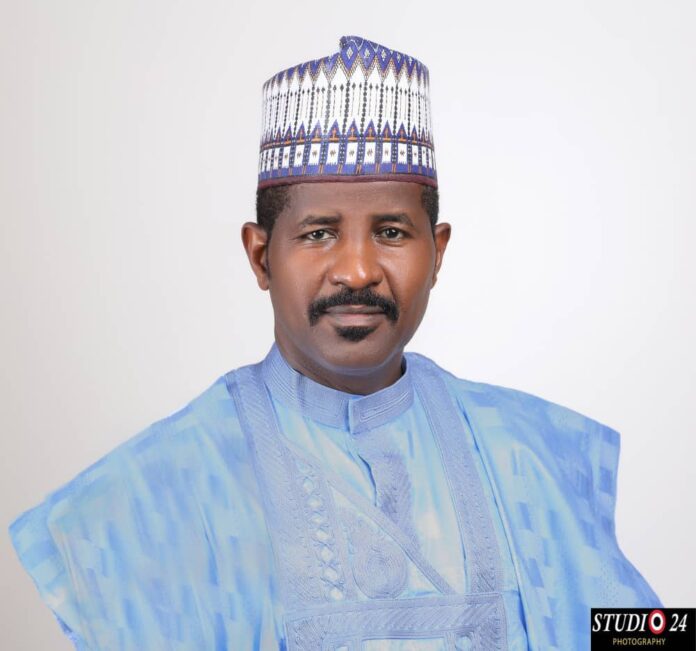Ex-NASENI CEO, Gwandu seeks unity among African Countries to secure 600MHz Mobile Spectrum
By Emma Ogbuehi
Erstwhile Executive Vice Chairman/CEO of the Nigerian Communications Commission (NCC) and former CEO of the National Agency for Science and Engineering Infrastructure (NASENI), Dr. Bashir Gwandu, has called on African representatives to the ITU’s World Radiocommunications Conference 2027 (WRC-27) to stand united in securing spectrum allocations critical for mobile connectivity in rural areas.
Gwandu who also held various chairmanship positions at the both the ITU and Commonwealth including the ITU Radiocommunications Advisory Group (the RAG), The Joint Task Group, and Commonwealth ITU Group (CIG) made the call during his opening remarks on the 600MHz spectrum discussions, at the recently concluded Sub-Saharan Spectrum Management Conference 2024 in Nairobi, Kenya,
In his opening statement, Gwandu, who spoke as an Independent Spectrum Expert, highlighted the need for honest discussions among African nations to avoid internal conflicts that could weaken the continent’s position on the world stage. “When we meet as a family, we must be honest with ourselves. We, as Africans, too often fight each other for the back seat, neglecting each other’s interests,” he said.
Gwandu who played a key role in founding the ATU (African Telecommunications Union) WRC coordination meetings, expressed disappointment that the continent’s focus on collaborative efforts is waning.
At the core of the discussions was the 600MHz (3GGP n71) band, a key frequency range that many countries worldwide are increasingly allocating for IMT to support 4G and 5G networks. While several nations in Regions 2 and 3, as well as some in ITU Region 1, have designated this band for mobile, some African countries are not yet ready to make the switch to co-primary allocation.
READ ALSO:
NASENI trains officers on global best practices
However, he stressed that African countries still not ready to adopt IMT in this band should not obstruct others that are ready to proceed. “The world is moving toward IMT in the 600 MHz band,” Gwandu emphasized, noting that diverse regional needs mean different countries may proceed at varying paces.
Meanwhile, as Africa faces a 50 per cent urban-to-rural connectivity gap and high energy costs, Gwandu argued that considerations and decisions must be flexible enough to support each country’s unique circumstances. Solutions suitable for smaller nations, like Rwanda or Benin, may not be viable for geographically larger, more populous countries like Nigeria or Namibia.
At the WRC-23 conference, a controversial decision allowed Egypt to move forward with its 600 MHz primary mobile allocation while Rwanda, Guinea, Benin, and Cameroon blocked requests from 10 other African nations with similar aspirations.
Gwandu argued that this action went against the ATU’s rules, which state that when eight or more countries oppose a proposal, it should not receive recognition under the AFCP (African Common Proposals) framework. He pointed out that with 11 nations opposing the NOC (No Change) position, the ATU should have allowed those seeking the 600 MHz allocation to move forward.
The 10 countries that were blocked include Nigeria, Senegal, Mauritania, Libya, Chad, Gambia, Sudan, Namibia, Somalia, and Tanzania. Dr Gwandu posited that fighting for status quo to remain or ‘No Change’ in this case is akin to refusing an available front seat and fighting for a back seat.
He called on African countries to engage in positive dialogue, urging a spirit of unity and cooperation to optimize Africa’s position in international telecommunications. “Reasonable countries have always found solutions to accommodate the needs of their neighbours instead of blocking them,” he further said.
Gwandu emphasized that regulatory certainty and direction are crucial for industries planning infrastructure investments and that Africa should be proactive, not divided, in pursuing these objectives.
Additionally, he stated that Nigerian delegates among others, were not satisfied with the limited time allocated to discuss AI1.5 at APM3-4 (African Preparatory Meeting 4) in Yaoundé, yet, as a gesture of flexibility allowed the discussions and process to continue.
This cooperative spirit, he said, should have been recognized at WRC in Dubai as an example of Africa’s collective goodwill. He emphasized that African countries should not have taken such an uncompromising stand to block 10 other African countries from addressing their unique issues since population, landmass, and economic aspirations differ, and that these should have been considered when making pan-African decisions.
Looking forward, African regulators are encouraged to design competitive markets that ensure efficient use of sub-1000 MHz bands, which cover the 600, 700, 800, and 900 MHz ranges. Low-frequency bands have strong penetration, allowing operators to reach rural areas with lower capital costs—a significant advantage for underserved regions.
Furthermore, Dr. Gwandu explained that structuring markets to support multiple operators in these bands could foster improved competition, and an aggregated 40MHz per operator in the bands could deliver higher speeds, bringing essential connectivity to rural schools, hospitals, and communities.
He reminded attendees at the Spectrum Management Conference of the economic potential tied to low-band spectrum allocation especially in Africa. With many African nations among the least developed, the GSMA Mobile Economy Report 2024 estimates that 5G could bring $130 billion in economic value by 2030.
Gwandu urged African delegates and the Union to aim beyond this projection by committing to ensure no African nation is blocked by another from joining the primary mobile allocation footnote, 5.307A, at WRC27.
“As the world looks toward a digital future, African delegates hope for greater unity in advancing telecommunications policies that support economic growth, improve connectivity, and enable Africa to take full advantage of the 600 MHz band amongst others for ubiquitous high-speed broadband connectivity”, he said.













